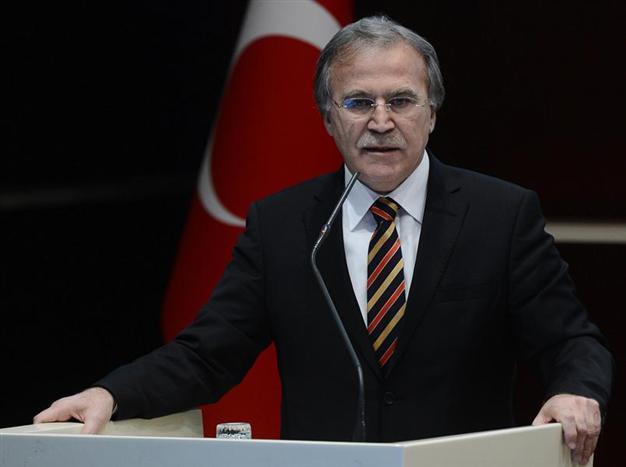‘Coup cleansing’ might be delayed
ANKARA - Hürriyet Daily News

‘We are looking at the laws ... to preventing future coups,’ says AKP deputy chair Şahin, head of a commission to revise the coup laws. AA photo
The Constitution Conciliation Commission has signed a crucial agreement in the last week. With the joint decision of the Justice and Development Party (AKP), the Republican People’s Party (CHP), the Nationalist Movement Party (MHP) and the Peace and Democracy Party (BDP), it was agreed that the General Staff should report to the Defense Ministry instead of the premier under Turkey’s new charter, in addition to deciding to strip the National Security Council (MGK) of its status as a constitutional institution.
Doubtlessly, the four parties, who could not agree on many articles of the new Constitution so far, agreed on this topic so quickly and determinedly due to the painful memories of the coup periods. It might be said that during and after the coup periods in Turkey, the army did not act so positively or tolerantly toward politicians. The dissolution of the parties, arrest of politicians, bans, censorship, frequent interventions in politics, memorandums, and such activities have affected this decision to a great extent.
Will the political bodies consent on constitutional reforms in order to make soldiers stay in their barracks? Turkish politics is discussing the coups and its results for a long time. Kenan Evren, the leader of the 1980 military coup, is currently being tried along with his colleagues. The Parliament’s Coup Inquiry Commission has issued a report, in which some considerable observations were made despite a few shortcomings. Changing the judicial legislation that is believed to form the grounds for coups is also among them. And the four parties agreed on this proposal without exception.
A total of 1,998 laws, 227 statutory decrees, 272 pieces of legislation and 375 parliamentary regulations went into effect after the coups in 1960 and 1980, as well as amid the period of the Mar. 12 memorandum of 1971, and the Feb. 28 process of 1997. The AKP founded a commission to revise these laws that is headed by the party’s deputy chair, Mehmet Ali Şahin. Last week, I had a chance to ask questions about the future of the commission’s works. “We are carrying on our works by expanding the laws. Along with the laws, we are also scanning the pieces of legislation and regulations. We are looking at the laws with an eager eye to preventing future coups,” Şahin said.
Şahin also said they were checking if there were some provisions against the “democratic stance” that has been achieved so far. “If there are some regulations that fall short of today’s democracy, we want to get rid of them. We are also scanning all the things that could contradict this democratic stance,” Şahin said. According to Şahin, the works with this regard are not scheduled yet, but they will submit it to the AKP group as soon as it is completed.
Actually, the AKP group aimed to finish this work by the end of 2012 and pass it through Parliament during the first half of 2013. Also, the cleansing process was set to be kicked off with the abolition of Article 35 of the Turkish Armed Forces Internal Service Law, which was regarded as the legal basis for coups. According to whispers in the corridors, the AKP is about to make a change in their schedule. Also, the coup-cleansing works were directly indexed to the future of the new Constitution. The jurists of the AKP are now leaning toward postponing the works a bit more since they believe that the legislation will completely change in parallel to the new Constitution if the constitutional process is completed and a referendum is made with the BDP’s alliance. Seemingly, the hopes to make a new Constitution by allying with the BDP have increased within the AKP.
So, if the new Constitution does not go into effect, what will be the future of the AKP’s coup-cleansing works? If so, the works will directly be brought to Parliament’s agenda by searching for an alliance with the opposition. Doubtlessly, the opposition will also favor this cleansing. The political bodies seem determined to abolish the reflections of coups and army in the civil arena, while underlining the limits of democracy.
Demirtaş's views on new charter
Last week, I interviewed the Peace and Democracy Party’s (BDP) co-chair, Selahattin Demirtaş, about the new Constitution. For Demirtaş, the BDP is not against making a Constitution by allying with the ruling Justice and Development Party (AKP). They will not approve a despotic presidential system, but they are still ready to discuss the system in principle, Demirtaş said.
“I think the possibility of forming a new Constitution is so weak now. The four parties could not even agree on 25 percent of the proposed articles. Also, the schedule of the elections and the Parliament is not appropriate to building a completely new Constitution. It is not impossible, but the possibility is weakening each passing day,” Demirtaş said.
Sarıgül's musts for candidacy
According to Republican People’s Party (CHP) leader Kemal Kılıçdaroğlu, there is only a four-point gap in the public survey between Şişli district’s mayor, Mustafa Sarıgül, and Istanbul Mayor Kadir Topbaş, who is from the Justice and Development Party (AKP), to be the next mayor of Istanbul.
Sarıgül seems to have a strong chance of being a candidate for the CHP. However, the whispers in the CHP corridors suggest that it will not be very easy. Sarıgül has some conditions for standing for mayor with the CHP. It is being whispered that he demanded to have a say in the determination of mayoral candidates for some districts in Istanbul. If this problem is solved, Sarıgül will join the CHP with a show of strength in June and initiate his election campaign.
